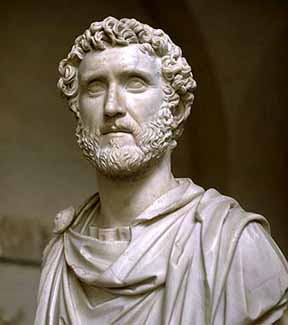
Antoninus Pius.
Antoninus Pius, whose full name was "Titus Aurelius Fulvus Boionius Antoninus," was born in the year 86 AD. He was of Gallic descent, but both his father and grandfather had attained consulships in Rome. He married Faustina the Elder when he was in his twenties, and when he was forty-four, in the year 130 AD, following his position as both quaestor and praetor, he attained the position of consul. Not long after this, the emperor Hadrian one of the four "circuit judges" who bore the task of administering law and order in Italy. He was in charge of the areas of Etruria and Umbria, where he already owned vast amounts of land. He built his reputation up when he was proconsul of Asia, and once he returned to Rome, he was appointed a member of the imperial council.
Upon the death of Hadrian's only heir in January of 138 AD, Hadrian chose to appoint Antoninus Pius as his new issue. On February 25th of the same year as his adoptive son's death, Hadrian adopted Antoninus Pius. Through a requirement of lineage, Antoninus Pius had to adopt Marcus Aurelius and Lucius Verus. Hadrian died of a prolonged illness on July 10, 138, and Antoninus Pius stepped up to the throne. In the year 139, he accepted the title of Pater Patriae from the senate along with his second through fourth consulships.
Antoninus Pius is well remembered for his love of peace and constant yearn for it. Despite this, his reign was not entirely peaceful, as few are. In northern Britain, in order to suppress an uprising, the Wall of Antoninus was built. In 154, some trouble caused by the Brigantes forced Antoninus Pius to temporarily withdraw some troops in his defenses, which was followed rather quickly by some indigenous tribes destroying his forts. He responded by forcing most of the people who lived between his wall and Hadrian's out.
Despite these issues in the outlying provinces of the Roman Empire, Antoninus Pius' main focus was within Italy. He spent great deals of money, though not an excessive amount, on things like baths, harbors, bridges, and amphitheaters. He also began a charity called the Puellae Faustinianae for Italian orphan girls, which was named for his late wife. He gained respect from the senate, and by his death in 161, had been a major player in the Pax Romana. His benevolent nature is well-remembered in the history of the Roman Empire. Marcus Aurelius later said to others of his father, "Remember his qualities so that when your last hour comes your conscience may be as clear as his."